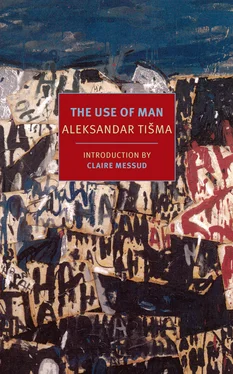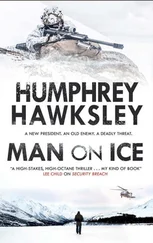Aleksandar Tišma - The Use of Man
Здесь есть возможность читать онлайн «Aleksandar Tišma - The Use of Man» весь текст электронной книги совершенно бесплатно (целиком полную версию без сокращений). В некоторых случаях можно слушать аудио, скачать через торрент в формате fb2 и присутствует краткое содержание. Год выпуска: 2014, Издательство: NYRB Classics, Жанр: Современная проза, на английском языке. Описание произведения, (предисловие) а так же отзывы посетителей доступны на портале библиотеки ЛибКат.
- Название:The Use of Man
- Автор:
- Издательство:NYRB Classics
- Жанр:
- Год:2014
- ISBN:нет данных
- Рейтинг книги:5 / 5. Голосов: 1
-
Избранное:Добавить в избранное
- Отзывы:
-
Ваша оценка:
- 100
- 1
- 2
- 3
- 4
- 5
The Use of Man: краткое содержание, описание и аннотация
Предлагаем к чтению аннотацию, описание, краткое содержание или предисловие (зависит от того, что написал сам автор книги «The Use of Man»). Если вы не нашли необходимую информацию о книге — напишите в комментариях, мы постараемся отыскать её.
A work of stark poetry and illimitable sadness,
is one of the great books of the 20th century.
The Use of Man — читать онлайн бесплатно полную книгу (весь текст) целиком
Ниже представлен текст книги, разбитый по страницам. Система сохранения места последней прочитанной страницы, позволяет с удобством читать онлайн бесплатно книгу «The Use of Man», без необходимости каждый раз заново искать на чём Вы остановились. Поставьте закладку, и сможете в любой момент перейти на страницу, на которой закончили чтение.
Интервал:
Закладка:
Fräulein’s struggle against her fever in Boranović’s clinic. Her father’s lame left leg, his limp, the movement with which he would drag his body out of immobility, out of deadness, into the green of the garden, the black silhouette of that leg, toward which she strains her every pulse, as if toward a high safe ledge, above the flames that are consuming her. Her arms have not the strength to raise themselves to touch that silhouette, that saving solidity that is moving away from her, limping, growing smaller, the uneven sound of its steps moving upward, becoming softer.
Robert Kroner lying on his black winter overcoat in the transit camp, his choking “No!” to Vera’s imploring cries, that “No!” to a continuation of the journey, a continuation of the suffering, a continuation of responsibility, sinking into irresponsibility, eyes shut tight, ears refusing to hear, thoughts refusing to understand that he is letting them go, leaving them, being left behind by them, abandoned to the shouts, the blows, the rifle bullets that now, suddenly, hit him at close range, tearing open his chest, setting him free, at last setting him free.
Nemanja Lazukić’s contempt for the roll call, for the lumbering prisoners tied to him, because he doesn’t belong with them, hates them, would like to push them away, spurn the faces and names that intrude on his senses, the ropes that cut into his flesh, because the prisoners are dragged along by their own weight, their clumsiness, their jerking movements, their joints red and swollen, the stench from their sweating bodies. His attempts to catch the eye of one of the guards, whose faces, in the cold gray dawn, show neither interest nor pity. His shout of “Don’t, brothers!” which is a lie, sour in his mouth, another lie among all the lies, lies from the beginning to this moment when truth is nothing more than contempt, the wish for exceptional treatment of which there is none, the revulsion that the shooting puts an end to, after which he is thrown onto a heap, on top of others, under others.
The amazement of Klara Lazukić at the rifles pointed at her in the same way, two years earlier, her dazed departure from her home (Have I dressed warmly enough? Did I lock the house?), her near-sighted eyes peering at the hail of killing on the other side of the street, which she can’t understand, can’t believe, her shudder at the detonations behind her, her scream, “Maybe they won’t! I’m not guilty! I’ve got children!” Her old-maidish lips twisted indignantly, her eyes raised, askew, toward the blank wintry sky.
The quiet, somnolent last breath of Tereza Arbeitsam, Kroner’s widow, née Lehnart, in the hospital in Stuttgart, whiteness all around. Exhausted by her long illness, dimly aware of a face, the face of a nun framed by a stiff white headdress, the features as severe as a man’s but the skin young and pink, a short, straight nose, red lips, that dear face to which she can no longer put a name or define its relationship to herself, and which swims away in the whiteness, in the cold mist.
Rastko Lazukić, crouched behind the boxes in a cart going at a full gallop, regretting that he didn’t jump off when the firing began, hesitating whether to jump now, but the shaking is cut short by a blow to the back, which jerks him upright, like the horse rearing in front of him, its huge arched back and head high as he falls over the sharp edge of something. “Is that my suitcase?” he wonders, feeling his strength, his consciousness ebb away, pouring warm and sticky from his mouth.
Sep Lehnart moaning for water in the cellar beneath the ruins of the former kolkhoz building in the village of Starukho, deafened by the noise of guns and mortars, which have destroyed everything, burying him among groaning wounded men in a semidarkness filled with dust. He sees their terrified faces, hears their pleas for water, of which there has been none for days and nights, ever since his belly was torn open down there where his moist, numbed hands are holding it together, where it seeps out, where he would place his cracked mouth if he could move, if his innards didn’t split apart at the very thought of moving. The wound pleads in vain for moisture, moisture to replace that flowing out, flowing out, which floods everything, the whine of the bombs, the dust and smoke, the cries that grow fainter, unreal.
Vera Kroner lying in the room overlooking the courtyard, the room that was once her grandmother’s, covered to her armpits with three blankets, for she has heard that the body gradually goes cold. She swallowed the pills from the palm of her hand and washed them down with wine from a big round glass, purchased the day before for that very purpose. Her head falls back with relief, her eyes close. She opens them again to see once more: the table and chair, the empty shelf, the stand with the empty flowerpot — not to bid them farewell, but to make sure that she is leaving nothing important. She is leaving herself, she thinks. But what that self is she cannot define. Noises from the street, a car, the wind whistling among the scattered old crates and rusty hoops in the courtyard. There is nothing else. She feels sick, it must be the medicine. She hopes it won’t get worse, it was only medicine, even though an overdose. Perhaps, instead, she should have lain down in a full tub and opened her veins, or have done that as soon as she swallowed the pills, as she first intended. It is probably too late for that now. Nausea shakes her body; she wants to vomit but knows she must not. With a great effort of will she stills the spasms in her stomach, forcing down the urge to vomit with all her pent-up fear, as with a fist, just once more, once more, she’ll do it as many times as is necessary, it’s like giving birth, but the opposite, she grits her teeth, this is the only way she can do it, and her child will be born.
Sredoje Lazukić, staggering, leaning on the boatman Steva Milovančev’s firm young shoulder, leaving the tavern Stolac, next to the rowing club, his stomach swollen from too much brandy because he drank all the pension money he was just given. Flashes of light dance before his eyes, as has happened to him before, for a long time now, every evening, even when he doesn’t drink. “I can’t see,” he mutters to Milovančev, who is dragging him on, but now his legs no longer answer to his will, they give way, he slips, and now lies on the grass of the embankment, with Steva shaking him and shouting. The flashes of light dance, violet and yellow, the ground is hurting him, there must be a sharp rock beneath him, if only he could move a little, to the left, but how can he tell Milovančev that when his tongue is stiff, his forehead, chest, and stomach are numb. The pressure of the rock in his side becomes unbearable, he pulls his arm out of its numbness and shoves it beneath him, but his fingers can feel nothing there but grass, the pain of the rock is inside him, it spreads through his chest, gripping him like an iron fist. Sredoje writhes. “Is it a rock?” he wonders and loses consciousness.
Around the bed of Milinko Božić, an unusually sharp current of air. Accustomed to sameness, to repetition, he senses danger, something above him, with his sharpened senses he can feel its size, a light breath on his face, male, not female, someone new, he concludes. The blanket is pulled back from his belly, fingers fall on his right thigh, pressing into his flesh, kneading it, looking for a spot to plunge the needle. Something is injected into him, although these last few days he has had no symptom of illness. Drowsiness. He is being anesthetized, then. Are they going to pull a tooth, he still has two or three, what else could it be? A new wound that opened up without his feeling it? The drowsiness enfolds him like feathers. How pleasant, he thinks, if they had kept me on that, I wouldn’t have been trying to understand, but perhaps I would have anyway; a man is a man because he tries to understand, and now I understand almost nothing, and in a moment I’ll understand nothing at all.
Читать дальшеИнтервал:
Закладка:
Похожие книги на «The Use of Man»
Представляем Вашему вниманию похожие книги на «The Use of Man» списком для выбора. Мы отобрали схожую по названию и смыслу литературу в надежде предоставить читателям больше вариантов отыскать новые, интересные, ещё непрочитанные произведения.
Обсуждение, отзывы о книге «The Use of Man» и просто собственные мнения читателей. Оставьте ваши комментарии, напишите, что Вы думаете о произведении, его смысле или главных героях. Укажите что конкретно понравилось, а что нет, и почему Вы так считаете.












